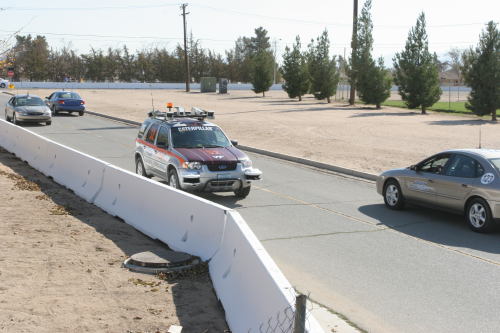Two wheeled robocars and the Twill
Submitted by brad on Wed, 2009-07-08 16:29I have mostly written about 3 and 4 wheeled Robocars, even when the vehicles are narrow and light. Having 3 or 4 wheels of course means stability when stopped or slow, but I have also been concerned that even riding a 2 wheeled vehicle like a motorcycle requires a lot of rider participation. It is necessary to lean into turns. It's disconcerting being the stoker on a tandem bicycle or the passenger on a motorcycle, compared to being a car passenger. You certainly don't imagine yourself reading a book in such situations.
On the other hand 3/4 wheeled vehicles have their disadvantages. They must have a wide enough wheelbase to be stable because they can't easiliy lean. In addition, for full stability you want to keep their center of gravity as low as you can. The extra width means a lot more drag, unless you have a design like the Aptera Motors entrant in the Progressive 100mpg X-prize, which puts the wheels out to the sides.
 I recently met Chris Tacklind, who has a design-stage startup called Twill Tech. They have not produced a vehicle yet, but their concepts are quite interesting. Their planned vehicle, the Twill, has two wheels but uses computer control to allow it to stay stable when stopped. It does this by slight motions of the wheels, the same way that pro cyclists will do a track stand. They believe they can make a 2 wheeled electric motorcycle that can use this technique to stay stable when stopped, though it would need to extend extra legs when parked.
I recently met Chris Tacklind, who has a design-stage startup called Twill Tech. They have not produced a vehicle yet, but their concepts are quite interesting. Their planned vehicle, the Twill, has two wheels but uses computer control to allow it to stay stable when stopped. It does this by slight motions of the wheels, the same way that pro cyclists will do a track stand. They believe they can make a 2 wheeled electric motorcycle that can use this technique to stay stable when stopped, though it would need to extend extra legs when parked.
This is intended to be an enclosed vehicle, both for rider comfort and lower drag. The seat is very different from a motorcycle seat, in that you do not sit astride the vehicle, but in a chair similar to a spacecraft's zero-G chair.
In addition, the vehicle is designed to have the rear wheel on a lever arm so that it can stand almost upright when stopped and then slope down low, with the rider reclined, at higher speeds. The reclined position is necessary for decent drag numbers at speed -- the upright human creates a lot of the drag in a bicycle or motorcycle. However, the upright position when slow or stopped allows for much easier entry and exit of the vehicle. As everybody knows, really low cars are harder to get in and out of. Twill is not the first company to propose a vehicle which rises and lowers. For example the MIT CityCar plan proposes this so the vehicles can stack for parking. Even without stacking, such designs can park in a much smaller space.




 This special chapter in my series of essays on Robocars describes a fictional week in the Robocar world, with many created examples of how people might use Robocars and how their lives might change.
This special chapter in my series of essays on Robocars describes a fictional week in the Robocar world, with many created examples of how people might use Robocars and how their lives might change.

 I discuss what predictions we can make about how long the Robocar future will take. While there are many technological challenges, the biggest barriers may be political, and even harder to predict.
I discuss what predictions we can make about how long the Robocar future will take. While there are many technological challenges, the biggest barriers may be political, and even harder to predict. Robocars will suggest a great number of possible changes in the way we design and market cars. I now encourage you to read:
Robocars will suggest a great number of possible changes in the way we design and market cars. I now encourage you to read: For part three of my series of Robocars, now consider:
For part three of my series of Robocars, now consider: